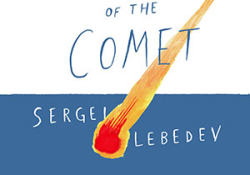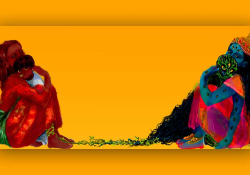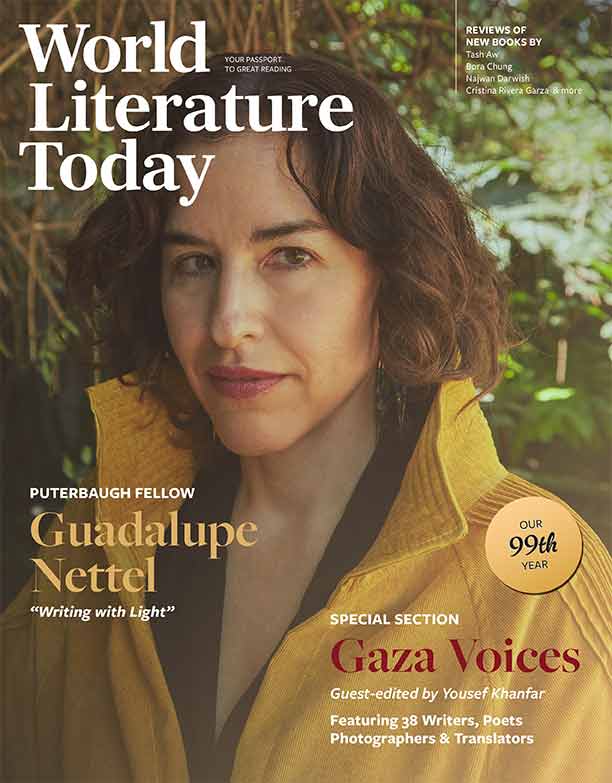Misfire

A Russian police officer tracks the surprising release of a prisoner to fight in the war against Ukraine. Recalling the prisoner’s capture, the officer regrets his gun’s misfire. Or was it?
“OUR PRIDE, OUR GLORY.”
The front-page headline in the local newspaper was printed in the largest font possible. Captain Chernykh couldn’t remember a larger one. Even when the minister of the economy came to the city that one time, the type wasn’t larger.
Our pride, our glory.
The headline fell apart before his eyes.
All he could think about was Natasha.
Chernykh forced himself to read the story one more time.
Celebratory ceremony with Army veterans. Central Park starts at five p.m. Free admission.
The subhead was also black and thick, the letters sticky and slippery, as if they had been made not with printer’s ink but roadside mud. Yes, mud. From the roads in the forests where the bodies had been found.
Central. Park. Starting. Free. Admission.
Natasha might see this, thought Chernykh, as he pushed the paper away and folded it. She might be reading it right now.
The captain recalled her face at the trial. Crooked bangs, as if the hairdresser had been tipsy, covering the empty eye socket. Her voice: remote, alien, from another world. The left eye, the live eye on a dead face, staring at the defendant’s bench. At Fakir.
Chernykh reached for the phone and pulled his hand back. He had nothing to say to her. His soul was empty. Empty, as if everything had been removed, including his first childish joys.
Even shame. He wasn’t ashamed anymore, impotent without despair, without a moral charge.
Chernykh remembered when he had told her before her testimony in court: “Do this. I’m begging you. For the other girls. You’re the only one who can defend them. Then he’ll get life. He will never come back. He will rot in prison.”
The captain had believed his own words then, and only now did he fully comprehend the hidden lie in them. He had passed the burden onto her of what he could have done himself. Could have, but didn’t. There was something he had not told Natasha. Something known only to him, his bosses, two members of the SWAT team, and a weapons technician.
Misfire.
Eight years. He had hunted that creature for eight years. That subhuman.
Eight years, Chernykh told himself, as if trying to convince someone, to prove something.
Nineteen bodies. The forensics teams worked on each for three days: animals and meltwaters had done their work. The youngest was sixteen, the oldest, twenty-three.
He saw the photos before his eyes. Pages of reports from the forensic specialists, lines in a detached language that explicated dispassionately the unimaginable, things that—if words could truly transmit the reality—would make your nails grow backward and curdle your bone marrow.
He recalled, with the same detachment, his anger, the wounding sinking feeling of operational failure, because that creature had incredible, animal luck, he was nearby, practically not hiding, but managing to leave no traces, slipping between seconds, between witnesses, between cameras. He was local, he knew the city, and the city knew him, but in another, false, persona.
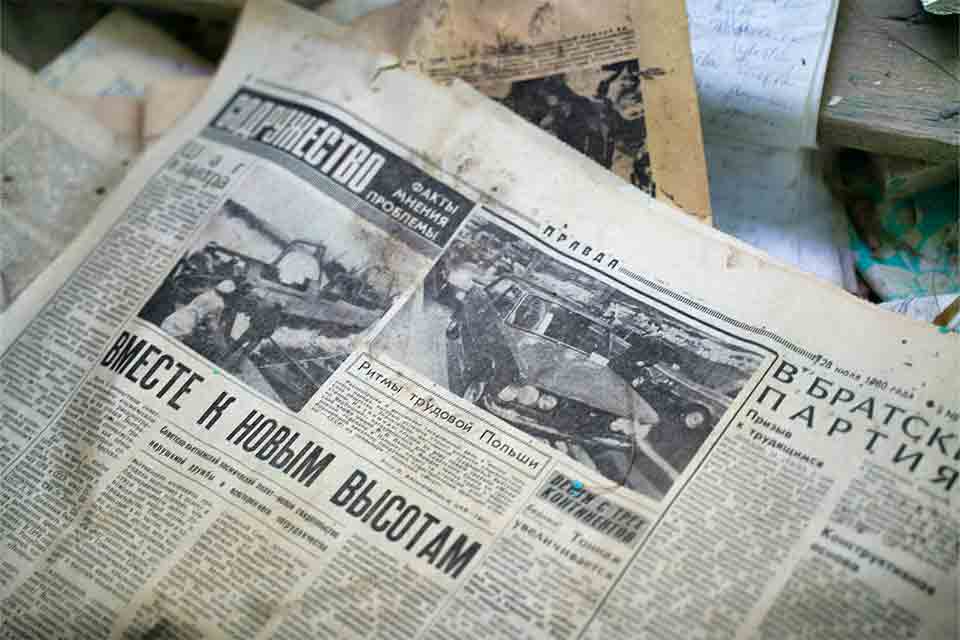
He was local, he knew the city, and the city knew him, but in another, false, persona.
Central Park, starts at five p.m. Free admission.
Chernykh opened the newspaper again. He reread it, weakly swallowing his humiliation.
Central Park.
Who the hell chose the place? As if it wouldn’t be as crowded anywhere else. And answered: Where else? There was only one space like that in the city.
Tomorrow the police would have to surround it and take, as their orders read, “all possible security measures.”
That is, to protect, among others, Fakir.
In Central Park.
One of his favorite hunting grounds. Where he used to offer girls a ride after the discotheque. They got in: he was a vocational schoolteacher, classes on work and life skills.
And as a sideline, an amateur magician, the star of every event at the school.
Chernykh remembered the equipment they found when they searched his home workshop.
Once again, he wanted to use all of it on Fakir—the local journalists gave him the nickname and it stuck, and he preferred not to use the creature’s name. Yes, use them all, the teeth, the springs, so they tore apart his body. Chernykh allowed himself to enjoy that wave, even though he knew it was just the specter of vengeance, a specter, specter, specter . . .
The captain pulled out his service pistol from its holster and weighed down the newspaper with it, right on top of the front-page story, on top of “Our Pride, Our Glory.”
With the edge of his mind he understood that this was just a game, an outlet for his injured—self-esteem? honor?—but he couldn’t resist. Carefully, so as not to make a final decision by accident, he allowed himself to imagine. What if tomorrow . . . during the ceremony . . . or wait . . . better in the morning, by the house where Fakir used to live and where he had returned . . . he would wait for him. . . .
The pistol seemed so reliable, so powerful, you could borrow some determination from it.
Chernykh picked it up and brought it to eye level, aiming at the calendar on the kitchen wall.
Suddenly he was back at that day when Natasha, who had managed to wound Fakir and escape, led them to his lair. When the SWAT team stormed the house, protecting themselves with shields, Chernykh stayed in the yard, wanting to be with them out front, praying that the bastard would not raise his hands but try to fight them off, because then they could shoot him and be done with it.
The house was full of noise, furniture knocked over, the cellar hatch smashed, and Chernykh heard the rustle behind his back too late. There was a small space between the sheds, filled with rubbish, rusty barrels, a bicycle, a greenhouse frame, and that’s where the wounded Fakir took shelter, and now he was out, limping, dragging a rusty cleaver, heading straight for the captain, just asking for a bullet.
Chernykh took a step back, drew his pistol, aimed straight for the chest, sensing that everything was in place, the shot already born and about to explode, leaving the smell of gunpowder and striking—and Fakir would fall onto a pile of rusty metal.
Rapturous delight rose in his chest, because everything was miraculously falling into place, no one could blame him: Fakir attacked a policeman. The earth pushed against the soles of his shoes, the earth said, shoot, otherwise that thing will live, eat, breathe, feel hot and cold. He pulled the trigger.
But his gun just crackled and clicked like a cigarette lighter. It was as empty as a prop. While Fakir’s axe filled with iron power, the power of a blow . . .
Behind him came a warning shot, over their heads, and a commando shouted, On the ground, bastard, on the ground!
Fakir, short, with a fat belly, black hair sticking up on his head, dropped the handle and fell to his knees and then stretched out on the wood chips. As the SWAT team tied him up, he stared at Chernykh, as if to say, you wanted to but couldn’t, dummy cop.
Our pride, our glory.
The captain moved the pistol and read the words again.
It was the same gun.
Forensics had shown then that the cartridge was faulty. Chernykh had used the gun afterward.
But now it felt as if the pistol was not a real one. Chernykh wasn’t real. The newspaper wasn’t real.
Only Fakir was real.
Real, because he managed to return.
Fakir got a life sentence. He was sent to Nameless, a penal colony in the north, which no one ever leaves. There were rumors that the guards would take care of Fakir. After all, prisoners did die there, and he had raised his hand against a policeman, and that was unforgivable.
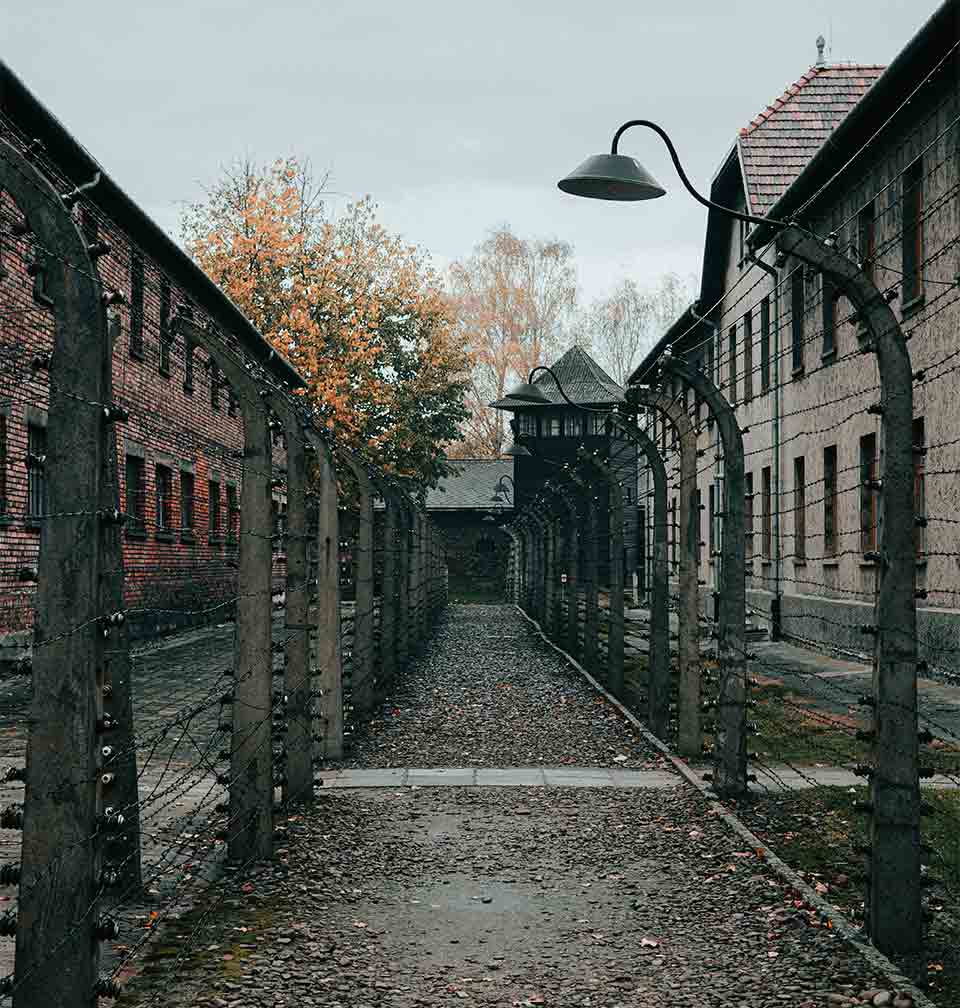
Fakir was sent to Nameless, a penal colony in the north, which no one ever leaves.
Chernykh did not care what the guards came up with. Let him live. Let him rot. Let the north finish him off, the cold winter chill his blood, the polar night eat his brain. Let him suffer. Chernykh left vengeance to the colony, to the northern climate, in order to forget that feeling of misfire, to stop thinking about how it happened, whether it was an accident or the pistol had not fired because he did not have the bravery he thought he did.
He got an early promotion to captain. And he was awarded the Order of Bravery.
Now there were two chevaliers of the order in the city.
Him.
And Fakir.
In his final word at the trial, Fakir did not repent. He looked around the courtroom from his cage, even the experienced guards tensed, and said what seemed to be the first thing that came to mind: “I’ll see you again.”
The victims’ families exploded. Die like a dog, they shouted, die, and Fakir looked hurt and confused, as if he didn’t understand why those people were yelling at him, why they hated him so much.
Chernykh had a jolt then, literally just for a second. He knew it all: no judge would ever reexamine Fakir’s case, no matter how many appeals he wrote, no power on earth would commute the life sentence, Nameless was a one-way ticket, no one escaped, but he felt the jolt, as if Fakir’s words had power.
He buried that feeling deep. He shaped up, grew in his work. Time passed.
Yet he continued counting the years of Fakir’s sentence. One, two, three, four, five. . . . The years mounted, and with each year Fakir seemed to go deeper into the ground, into that barren northern ground where one day he would lie in the prison’s graveyard.
Natasha called him a few times. She remained in the city. She worked in a tailor shop, she was an excellent seamstress. He once brought his uniform to be let out—he had put on weight—and as he watched her mark fabric with chalk, watched the sewing-machine needle flash, he thought that she was sewing up something that Fakir had torn apart, and she would spend her whole life sewing, repairing the holes he had left.
There could have been something between them, between the captain and seamstress, but he didn’t make the move, because of that misfire she was like a pebble in a shoe, an unnecessary bitterness.
It’s better that I didn’t make that move, he thought, licking his lips neatly. Better.
On February 24, 2022, the day of the invasion, Chernykh, in accordance with orders, gathered the personnel of the central district department and read the instructions: Increase vigilance and do not allow unsanctioned gatherings. He thought to himself: It should have been this way a long time ago. Do it and be done. No phony diplomacy, no hassle. We’re taking what’s ours. Without misfire.
In the park by the fountain covered with plywood for the winter, there was a demonstration. Well, not much of a demonstration, it was twenty below, maybe fifteen people, if that. They held a poster, a white sheet of paper with a dove on it. He said through the megaphone: Disperse, citizens, but thought: Why a dove? Are they nuts? He recognized Natasha, in a dog-fur coat, which she sewed herself. A stunned revulsion overcame him: Why are you here? Who are you with? With monsters? Fascists? He wanted to shake her until the coat came apart at the seams, until the buttons fell off.
A platoon holding shields formed at the edge of the square, their helmet flaps snapping shut. The crowd left, disappearing in the twilight, leaving the dove poster on a snowbank, and Chernykh trampled it into the sugary, icy snow.
The captain looked at the headline again.
Our pride, our glory.
He moved the pistol around on the newspaper, trying to find the only right place for it.
He couldn’t.
He raised the pistol to his temple. Then to his lips. The cold metal tasted sour. He knew it was a game, that he didn’t have the strength to shoot himself, but he moved the pistol over his forehead, creating a semblance of an alibi in someone’s eye: See, I tried, I did, I considered it . . .
He put the pistol back on the newspaper.
There was a sour taste in his mouth.

It had grown sour just that way when he learned that they would be sending prisoners to fight in the war. The Federal Penitentiary Service was told: anyone with any sentence except a political one.
He didn’t even think about Fakir at first. He was just angry: How can they? Presidential pardons? For all those bastards? The ones he, and people like him, put away? How can that be? Are they all fucking nuts?
A weak inner voice whispered: If they are on our side, then who are we?
Who are we?
That’s when he thought of Fakir. He had spent eight years inside. He was forty-nine. His age was suitable. They’d let him out—he would volunteer. They would let him out.
That evening after the meeting, he called over his colleague, Captain Nefedov, with whom he had hunted down Fakir, and asked straight out: “Did you hear about the recruitment? Our guy will be released.”
Nefedov replied perplexedly, “That’s better. They are in penal battalions, cannon fodder. My brother-in-law is a commander there in a private military company. They send them out to be killed. Utilization. A wise man came up with the idea.”
“Utilization” was the word Chernykh took home.
“Utilization” explained everything so well that he accepted Nefedov’s logic.
Utilization. They won’t let them go. The pardon was just smoke and mirrors. They would all stay there. They would all be used up. Shrapnel, bullet, enemy fire, friendly fire—Fakir was being let out to die.
Our pride, our glory, read Chernykh again, and he thought the letters were showing off and making faces at him.
The letters on the Telegram channels he read at night, drunkenly, also jiggled around. Nefedov had sent him the first link: he had found out through his connections that Fakir was out and he found the channel for his unit.
Crazy pictures: chaos, running, shooting from building to building, or tiny figures photographed from a drone, you couldn’t understand shit, but Chernykh was stuck, he wanted to see Fakir, or better yet, his death, the ground wouldn’t bear a bastard like that.
They were firing heavily from the Ukrainian side, and Chernykh noticed that he wanted them to hit harder, so that the bullet with Fakir’s name on it would be shot sooner. Of course, they were the enemy, on that side. But a necessary enemy, who had to finish a job for Chernykh.
Later, as if he had crossed some line, Chernykh began looking at Ukrainian sites as well. First the channel of the brigade that stood opposite Fakir’s unit. Then channels belonging to other, neighboring units. Subdivisions of drone operators.
He installed a VPN. He cleared the cache every morning. If they ever found the history, it would mean big trouble for him.
Without noticing it, he was drawn in, used to seeing through their eyes, through the lenses of their cameras. He rooted for them, like for a sports team. The closer it came to the six-month deadline after which Fakir could leave the army, the more fiercely and desperately Chernykh scrolled the foreign feeds, searching, watching the same reels a dozen times. He was no longer ashamed. He was a different person by night, he no longer had a side, he didn’t belong here or there, he prayed for the bullet to strike and swore that he wouldn’t ever look at the feeds again, just kill him already, kill without a misfire, without a mistake.
In the fifth month, Fakir’s company at formation was hit by an American himars multiple rocket launcher.
That was when Chernykh saw Fakir for the first time.
Alive.
For a second.
He was sitting behind the field kitchen, which had shielded him from shrapnel, removing porridge mixed with blood from his face.
Baring his teeth.
Five of them survived. It was on all the sites.
Chernykh’s anger at the himars operator for wasting the rockets was so great that in a drunken rage he started writing a comment on a Ukrainian site: You sloppy idiots couldn’t even hit straight. . . .
Thank God he came to his senses. Before he hit send. He realized what he was writing and where.
He set his phone aside. He folded his hand in front of his face, as if for prayer. Took a breath. Erased Telegram from his phone. Played the Russian national anthem on YouTube, stood up at attention like in formation, and sang along with the chorus: Russia is our great country.
A week later he folded. He downloaded Telegram again. Just in time, as it turned out. He just wanted to look one more time. He flipped through the channels and saw a new video from the Ukrainian drone operators. Something about an unlucky orc.
A little man dashing about, running around a tree, first left, then right, while a drone followed him like a crazed dragonfly. The little man seemed to be pulling the drone closer to himself, closer, closer. The camera on a second drone pulled in for a close-up. It was Fakir. Strangely sprightly, thinner. It was his face. His movements. He darted to one side and dove like a fish into a dugout. The drone followed like a swift dragonfly, smoke covering everything, boards flying into the air.
The text across the screen read: Minus One.
Chernykh watched and couldn’t get enough of it; he watched a second time, a tenth, a twentieth; he wanted to send it to Nefedov but restrained himself, it was a Ukrainian channel, after all. He whispered to the drone operator: Come on, come on, come on, a little left, now—boom!
Minus one.
Two weeks later the division chief called him in. He told him Fakir was coming back. Because he was wounded. Pardoned, awarded the Order of Bravery, and invalided out. That’s it. Go back to work.
Chernykh was amazed by how easily, without resistance, he accepted it. As if he hadn’t been overjoyed by the seeming death, hadn’t stayed up all night watching the Telegram app.
It was as if he were made of rubber and could be molded into any shape. As if he had known that this was what would happen and had only playacted, imagined all his feelings.
Our pride, our glory.
Chernykh read it aloud, mockingly, in a nasal tone: Our pride, pride, pride.
“That’s the policy now,” Nefedov told him in the smoking room, apparently forgetting his speech about utilization. “Redemption and freedom. They’ll make heroes out of them. The wind blowing down from the very top.”
“And then?” Chernykh asked, a challenge in his voice.
“And nothing,” Nefedov responded nastily. “He’ll take up his old ways, we’ll catch him. He’s no good for the army now. It won’t work a second time. Just stop carrying on about it. Shit happens.”
What happened in the dugout, wondered Chernnykh. Did the grenade bounce off? Blew up right at the entrance, while Fakir hid behind something or someone?
He thought about it, but actually he didn’t care.
Our pride, our glory.
Celebratory ceremony with Army veterans. Central Park starts at five p.m. Free admission.
Fakir would be there, in the front row. They wouldn’t let him onstage, be thankful for small favors.
Chernykh had already seen him. In profile on the street. He had come out of the supermarket with a carton of kefir and was drinking it on the go, tipping the carton high, a whitish stream dripping down his neck, and Chernykh thought that it was strange, inhuman white blood.
I will wait, I will wait, Chernykh told himself, realizing the emptiness and insignificance of those words.
He decided to call the victims’ families before the event. Warn them. He thought it was necessary.
He decided to call the victims’ families before the event. Warn them.
“Hmmm, yes,” replied the mother of the next-to-last dead girl. “Yes. Both my older son and my husband are at the front. See how things happen. How odd.”
He didn’t call anyone else.
Our pride, our glory, he read indifferently, without fooling around.
He put the pistol in its holster.
He was thirsty.
He opened the refrigerator. There was only kefir, old, probably sour. But he drank it, emptying the carton, and then returned to the table and said to no one: “So, that’s how we’re going to live, Aunt Lusya,” even though he didn’t have any Aunt Lusya, the name just popped up.
Chernykh looked at his watch: 7:32.
Time to go to the office. Some things had to be changed in the plan for tomorrow’s event: they would need four metal-detector frames, not three.
There would be a lot of people.
Translation from the Russian
Editorial note: First published in Nein! Stimmen aus Russland gegen den Krieg (Rowohlt, 2025).


